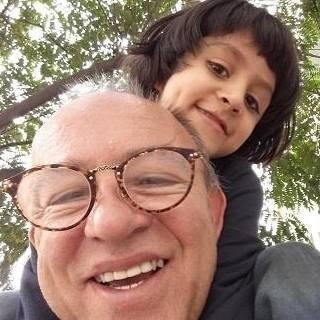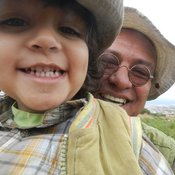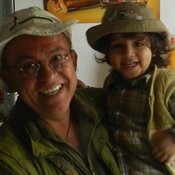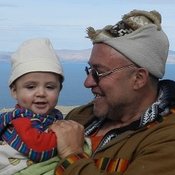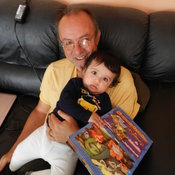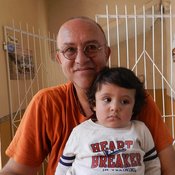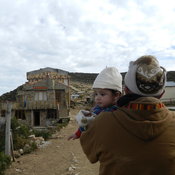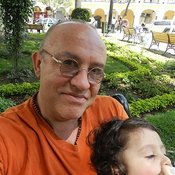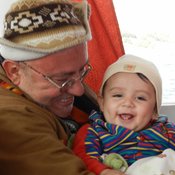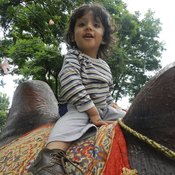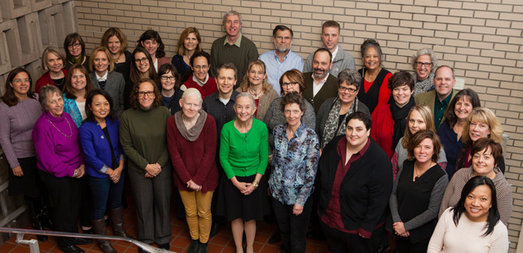 At an early age, I became acutely aware of the power in something as simple as listening. I would sit for hours at dinner parties and talk to each ba (older woman) and dada (older man). Often I was the only young girl not playing with the other children. I became very interested in their stories, what their lives were like in India, why they immigrated to the United States and what they missed most about their ancestral homes. I learned to watch the story teller’s eyes. Their eyes would often speak to me as much as their words. While the details were different the themes were similar. Most had come to the United States because their sons or daughters had immigrated here. In India, children, particularly males, are expected to care for their aging parents. Elders, being so far away from home, often talked about a sense of loss: loss of their homeland, their sense of purpose, and their place in society.
At an early age, I became acutely aware of the power in something as simple as listening. I would sit for hours at dinner parties and talk to each ba (older woman) and dada (older man). Often I was the only young girl not playing with the other children. I became very interested in their stories, what their lives were like in India, why they immigrated to the United States and what they missed most about their ancestral homes. I learned to watch the story teller’s eyes. Their eyes would often speak to me as much as their words. While the details were different the themes were similar. Most had come to the United States because their sons or daughters had immigrated here. In India, children, particularly males, are expected to care for their aging parents. Elders, being so far away from home, often talked about a sense of loss: loss of their homeland, their sense of purpose, and their place in society.
Experiences within my own family also serve to cultivate a keen interest in immigration issue. My maternal grandmother was compelled to seek asylum here following the brutal beating of her son in a military coup in Fiji. Today, she expresses somatic symptoms of depression such as dizziness and stomach aches; she rarely, however, seeks appropriate medical help. “It's my destiny to feel bad, I must have done something wrong in my past life – it's my karma and I cannot fight that nor can a doctor.” This view of one’s place in life is characteristic of traditional Indian culture. My paternal grandmother vowed never to leave her home in Zambia to join her grown children, remarking: “I don't want to follow my children to America and fall into a black hole like my friends have”; she would later be murdered in the country she loved by her housekeeper of 40 years. Although I always found myself deeply saddened and sometimes even angered by the experiences of my grandparents and other elderly community members, I remain fascinated to this day and look forward to listening to these stories for decades to come, thriving on the power in the simple act of listening. Actively engaging the elderly in their life stories can instill a sense of purpose and meaning to their past. I believe that in order to have hope for our future, we must identify meaning and purpose in our past. This belief led to my desire to become a social worker.
The more experience I have gained, the more I have come to realize the utility of an advanced degree. Earning the DSW will not only give me the academic credentials that advancing in my field will require, but it will also give me the tools necessary to develop effective and efficient programs, make important contributions to changes in policy and practice, and conduct valuable clinical research in area that has been neglected. Armed with a doctoral degree, I aim to better help the local communities I serve by developing evidenced-based, clinical programs that meet the needs of the community. I hope to play a critical role in higher education settings: engaging young minds to explore the field of aging and provide much needed services to a rapidly growing segment of our population in need of enormous amounts of care. I also look forward to deepening my understanding of my own feelings, attitudes, and relationships with clients—all of which play critical roles in processes of helping and healing that serve as foundations for full professional maturation.
By obtaining a DSW degree at the University of XXXX, I will be fully immersed in the cutting-edge research on best practices, and will have the opportunity to study the full gambit of evidence-based theoretical approaches, scientific principles, and expert opinions which will be vital to my success as an advanced practitioner. I am particularly drawn to the DSW program at the University of XXXX because of faculty such as Dr. XXXX, since my own research interests are a close match with much of his research on caregiver burden. My interest in caregiver burden has grown out my extensive professional experience in home care and as a hospice social worker. I have personally witnessed many cases of caregiver burden and the lasting impact it has on the caregiver’s physical health and mental wellbeing. I believe it is important to better identify the factors that make one more susceptible to the risks of caregiver burden, so that we will be able to provide increasingly appropriate and efficacious support. In addition, I believe that different cultures have different risk factors that contribute to the character and intensity of caregiver burden. Thus, we need to identify these culture-specific risk factors so that we can provide competent care to an increasingly multi-cultural society.
While working as a clinical social worker for a hospice company, I found one case particularly challenging, helping me to better understand the need for culturally competent services in hospice care. I received a call from the hospital social worker about MJ, a 66 year old woman who had immigrated to the United States from India. She had been diagnosed with a particularly aggressive form of neck cancer. I met her shortly after her third arrival to the emergency room in two months. Her tumor was considered terminal so her oncologist wrote an order for a hospice consultation. The discharge planner at the hospital reported that the patient had to discharge within a week. The patient did not want to go back home with her daughter. She was not eligible for state assistance, had no Medicare benefits, and did not have enough funds for assisted living or a nursing home.
When I walked into MJ’s room she said in English: “A desi (Indian) girl, now are they going to get me some desi food.” We formed an immediate bond; MJ was funny, articulate, and loved Indian culture. Soon, I learned that she had major unresolved issues—beginning with a rape in India 35 years ago--that she needed to work through quickly. MJ lived with her daughter who was her primary caregiver. Yet, she did not want to go ‘home’ with her daughter. “I would rather die in the hospital then go back there. My daughter is no good! I can’t tell anyone here but since you are desi, I know you will understand.” In the United States, where patients are asked to make their own decisions, it can be overwhelming: “I can't make a decision about hospice care; a sick person should not have to make such difficult decisions.” After we had a few more conversations, she declared “I'm not ready to die; I have a lot of problems that need to be fixed and I am feeling really down about it. My daughter and I don't get along. I have not spoken to my Aunt in India in over 35 years.” I knew MJ's feelings were not uncommon. Many older adults I had worked with in the past struggled with feelings of fear and inadequacy as they reflect on their lives, and much like MJ, many experience anxiety and depression if those feelings remain unresolved. I knew that in order for MJ to be comfortable with accepting her diagnosis; she needed to deal with her unresolved issues. Reminiscence therapy often can be helpful in situations like MJ's, helping clients to deal with unresolved emotional issues.
I began using reminiscence therapy techniques with MJ. After a few days of exploring her past with her, she was able to develop insight as to why she was so angry. Her parents died suddenly in a car accident when she was sixteen years old. She was forced to move in with an aunt who was a stranger to her. Raped at the age of 19, giving birth to her daughter as a result of the rape, she ran away to the US with a male friend who later left her for an American woman. When working with hospice patients, I often use short-term therapy techniques to help individuals better cope with an experience or event that produces emotional, mental and physical distress. Often the people I worked with had limited time do deal with these situations because they were terminally ill; however, these unresolved issues caused tremendous amounts of stress and anxiety. After MJ revealed some of her past, I began meeting with her on a daily basis to help her process her feelings. Soon, she discovered, through daily individual therapy sessions, that she had suffered from an inability to sustain relationships for fear of being abandoned. MJ was very concerned about her relationship with her daughter and felt that her daughter did not love her. So I scheduled family therapy following MJ's individual therapy sessions. Family therapy gave both MJ and her daughter an opportunity to express their feelings in a safe therapeutic setting. Through the use of family therapy, MJ gained insight into her anger and how it was negatively affecting her relationship with her daughter. MJ and her daughter both wanted to reconcile and in order for them to sustain a healthy relationship new parameters and structures needed to be created. Through the use of cognitive behavioral therapy techniques, MJ and her daughter began respecting each other, establishing boundaries, and the relationship began to heal. Within seven days of daily visits and the use of various therapy techniques to help mother and daughter resolve their issues, MJ decided to move back in with her daughter and accepted hospice services for additional support. MJ was on hospice for 4 months before she died. During that time I made weekly visits to her home and we continued reminiscence therapy. “Storytelling” as MJ called it, helped her connect the dots and make sense of the issues that had negatively impacted her for years. In Sanskrit we say: “A secret is like the skin of a leper; it eats away at you until you die.” On our last visit, MJ confided: “I no longer have any secrets, I feel more alive now than I have in the last 35 years.” She died peacefully in her daughter’s home with both her daughter and her aunt from India at her bedside. In all likelihood, MJ would never have utilized hospice services if culturally competent care had not been provided. She helped me to more fully realize the desperate need that we have in our increasingly pluralistic America for culturally competent services in hospice care and the importance of utilizing therapy techniques such as reminiscence therapy in culturally specific contexts.
Towards the beginning of my social work career, prior to obtaining my MSW, I was not yet fully aware of the theory behind my method. Now, I better understand that cultural competency was the principal theoretical framework that guided my early social work practice, in terms of individual as well as group therapy and helping organizations to develop policies along with programs or trainings. I generally placed a priority focus on the cultural aspects that influence care and the development of appropriate intervention strategies. While, I still see the cultural competency theoretical framework as a natural extension of my personality and the centerpiece of my own clinical practice; by the time that I was studying towards the MSW, I was already beginning to make good use of a variety of theoretical techniques. Initially I had a difficult time operationalizing theory in practice. With more experience and further study, however, I became more adept at as well as conscious of my application of theoretical models. The idea of choosing “one” theory to guide my clinical practice never appealed to my unchained way of thinking.
Particularly as a result of my work with people from a variety of cultures, I have become increasingly aware of the need for a holistic approach in my clinical practice. Questions like: What if the particular theory I choose is not sufficient to help all the clients I serve? Will the agency I work at influence what theoretical approach I use? Will adherence to one theory limit my ability to see other perspectives thus potentially not meeting the clients’ needs? These questions led me to develop an eclectic approach to my clients’ individual needs based on a holistic assessment that includes cultural factors.
Especially in the field of aging, I have found it essential to have a conceptual framework that relies on numerous theoretical models, always keeping in mind the interconnectedness of human behavior, life experiences, and culture. Social work theory associated with the concept of eco-system is the overarching framework that binds together my philosophy of specialized clinical practice, allowing for the application of a wide range of conceptual, practical, and productive approaches. When working with hospice patients that display signs and symptoms of anxiety and depression, for example, I have often incorporated life review or reminiscence therapy techniques into their treatment plans. Many patients, especially toward the end of their lives, find profound satisfaction in achieving closure on events that have not been resolved. Solutions-based brief therapy has also proven to be successful with a variety of my patients. For some patients, a focus on the present seems to work better than a focus on the past and they are hungry for practical tools and skills to accomplish their goals. When working with caregivers who display signs and symptoms of caregiver burden, I have often used techniques from both strengths-based and empowerment therapy. Helping client’s to understand the multi-faceted breadth and depth of caregiving, at the same time that a focus is developed on what it is that they are doing well, often empowers the caregiver to be able to ask for what they need. Generally speaking, both experiential-based family therapy and behavioral models are especially useful for identifying maladaptive behaviors and defining and implementing new communication styles.
With the assistance of your distinguished faculty at UXXX, I hope to investigate the extent to which Reminiscence Therapy is an effective method for dealing with unresolved issues and subsequently improving life satisfaction in older immigrant populations who are enrolled in a hospice program. I also want to explore the way in which Reminiscence Therapy helps the caregiver, often their adult child, bond with the older immigrant, thereby improving life satisfaction at the critical end stage of the older immigrants’ life. I am not yet aware of any research with reminiscence therapy that studies its utility specifically for older, first-generation immigrants and their caregivers; despite the fact that older adults make up over 12 percent of the immigrant population in the United States and that number is expected to grow exponentially as parents continue to follow their immigrant children to America. Furthermore, there is very little research on therapeutic interventions by social workers in hospice settings in general and none that I could find that explore therapeutic interventions specifically addressing the unique needs of older immigrants and their caregivers.
In my experience as a clinical social worker in hospice care, I find that social workers often use the phrase “difficulty coping,” for example, without any further detail as to the nature or degree of the impairment, or any intervention that was done in response. Social workers need to be trained to use specific clinical interventions when working with all hospice patients and their caregivers. These clinical interventions can reduce anxiety, depression, and help with unresolved issues, improving overall life satisfaction. While there is a need to address these issues with immigrant and non immigrant hospice patients alike; I hope to specifically study how Reminiscence Therapy can increase the life satisfaction of older immigrants and their caregivers by improving the caregiver/care recipient relationship as a result of working through unresolved issues. It is my hope that the exploration of this clinical issue could represent an important contribution to social work practice insofar as it would help us to better understand the dynamics of and challenges faced by older immigrants in the hospice setting, especially with respect to their relationships with their caregivers,
I thank you from the bottom of my heart for your consideration of my application to your program.

